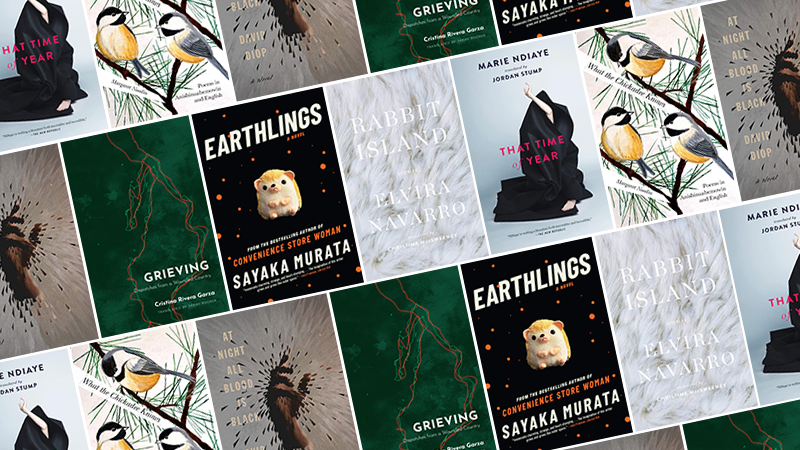
Summer is often a time of travel, when many people have vacations from school or work. While this pandemic year was not conducive to traveling, books have long been the most analogue of transportation options. Why not pick up a book in translation, and travel into the perspective of some authors whose first languages aren’t the all-dominant English? Here are 10 new and forthcoming titles in translation, from fiction to nonfiction to poetry.
Echo on the Bay by Masatsugu Ono, translated from the Japanese by Angus Turvill
(Two Lines Press, out now)
This is a slim but expansive novel, set mainly in a small Japanese fishing village. Told from the point of view of the middle school daughter of a less-than-motivated police chief, the story combines mystery, procedural, coming of age, and mysticism as the characters in the community grapple with a deadly red tide, political corruption, labor, and human connection. It’s an engrossing, mind-bending read.
That Time of Year by Marie NDiaye, translated from the French by Jordan Stump
(Two Lines Press, out now)
The latest novel from prolific French writer NDiaye follows a man named Herman, who was on vacation away from Paris with his wife and child in a small village. As the season changes from summer to fall, Herman’s family goes missing, and he sets out on an increasingly unmooring and nebulous journey to find them. But what is he really looking for? Another slim, twisty narrative, this is a perfect read for when you’re getting into that kind of eerie fall mood.
What the Chickadee Knows: Poems in Anishinaabemowin and English by Margaret Noodin
(Wayne State University Press, out now)
It’s unfortunately rare to see a book published in translation from an Indigenous language, but all of these poems were first conceived in Anishinaabemowin before being translated by their author into English. Noodin teaches Anishinaabemowin in addition to being a professor of English and American Indian studies at the University of Wisconsin-Milwaukee and a prolific writer of nonfiction and prose. The poems here, like her previous collection Weweni: Poems in Anishinaabemowin and English (Wayne State University Press, 2015), beautifully center Anishinaabe philosophy and language as a future, not just a past. They are also a joy to read.
Agatha by Anne Cathrine Bomann, translated from the Danish by Caroline Waight
(Book*hug, 9/29)
Another rarity in English translation is Danish literature, at least when it’s not firmly in the category of Nordic Noir. A 71-year-old psychiatrist who lives alone in his childhood home is ready to retire (very late for a Dane!) when one day a German woman named Agatha shows up looking for treatment. As they begin the therapy journey, it becomes clear that the psychiatrist has his own issues to confront. This is a sweet little book and a welcome addition to Danish literary fiction.
At Night All Blood is Black by David Diop, translated from the French by Anna Moschovakis
(FSG, 10/6)
A young Senegalese man named Alfa is conscripted into the French army in World War I. When he refuses to kill his injured friend, who asks him to put him out of his misery and slowly dies while experiencing psychological trauma, Alfa starts up a ritual of crossing enemy lines at night and murdering a German soldier, taking with him a hand from his victim. In this violent but stunningly written novel, French-Senagalese writer Diop has created a slim but stunning narrative of history, race, brotherhood, storytelling, and war.
Grieving: Dispatches from a Wounded Country by Cristina Rivera Garza, translated from the Spanish by Sarah Booker
(Feminist Press, 10/6)
Cristina Rivera Garza’s writing is fire. She is also one of the most prolific writers alive today, working in all genres, including as a translator herself. In this hybrid collection of fiction, essays, and journalism, Rivera reckons with U.S. border violence, including narratives about trafficking, corruption, social justice and resistance. This is another vital book from Feminist Press.
Earthlings by Sayaka Murata, translated from the Japanese by Ginny Tapley Takemori
(Grove Press, 10/6)
Sayaka Murata’s Convenience Store Woman made big waves when it was released last year, though she is the author of numerous novels. With her singular, almost quirky style, Murata is back with a story about a young misfit whose cousin claims to be an alien. Is Natsuki an alien too? Murata’s writing is such a strange joy to read, expertly rendering parables about gender and society in page-turning, imaginative prose.
Where the Wild Ladies Are by Aoko Matsuda, translated from the Japanese by Polly Barton
(Soft Skull Press, 10/20)
In this delightful, sharp, poignant collection of linked short stories, Matsuda writes feminist retellings of Japanese folk tales populated by ghosts, all of them women, who are recruited into a mysterious company run by Mr. Tei. These stories are such a joy to read, with a soothing and refreshing quality that centers and celebrates “feminine” energy, which is as expansive here as it is in real life.

Harmada by João Gilberto Noll, translated from the Portuguese by Edgar Garbelotto
(Two Lines Press, 11/10)
Harmada is the name of a capital city of an unnamed nation, and it is the destination for the unnamed and uncategorized narrator of this labyrinthine novel from Brazillian writer Noll. On his journey to this place of ostensible glory, the narrator, is folded into different chronologies and planes, transitioning between human and divine occupations, in a story about art, vanity, and freedom.
Rabbit Island by Elvira Navarro, translated from the Spanish by Christina MacSweeney
(Two Lines Press, February 2021)
In this sometimes unsettling, always engrossing short story collection, the animalistic and the human are one, both physically and metaphorically. Navarro is one of the most celebrated young writers in Spain, and this book is ample evidence of her talent for using spare prose to convey the bizarre and the sublime at once. The way she blends the physical and the ethereal is impressive. This will be a great book for those cold February nights

